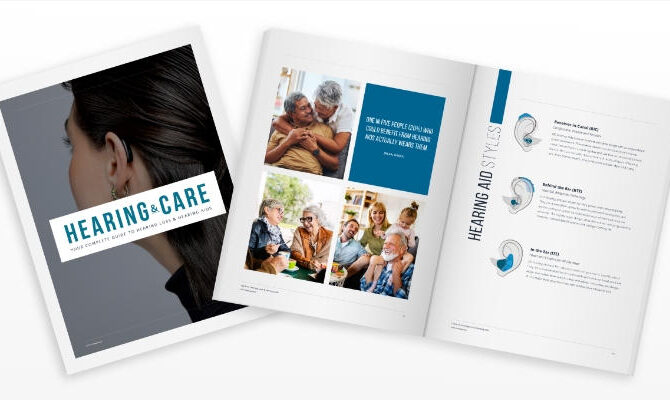How Does Untreated Hearing Loss Affect Mental Health?
Most people understand that hearing loss makes it harder to follow
We’ve Moved to a New Location! Click Here for Location Details →

By: admin | November 28, 2024
Most of us get regular checkups for our teeth, eyes and overall health, but hearing tests often slip under the radar. Yet our hearing plays such a vital role in our daily lives – from sharing laughs with friends and family to enjoying our favorite music or simply hearing the birds chirp. A hearing test isn’t just about checking whether you can hear beeping sounds; it’s about understanding how well you’re connecting with the world of sound around you.
Think of a hearing test as a window into your hearing health, showing not just what you might be missing, but also revealing patterns in how you hear different types of sounds in various situations. Maybe you’re hearing just fine in quiet rooms but struggling during family gatherings, or perhaps certain voices are becoming harder to understand than others. Understanding these patterns through regular hearing tests helps catch small changes before they become bigger challenges. Plus, having a clear picture of your hearing health today gives you and your audiologist the information needed to keep your hearing sharp for all the important moments in life.
There are several signs that may indicate you need a hearing test. One of the most common is difficulty understanding conversations, particularly in noisy environments. If you frequently ask people to repeat themselves or struggle to hear certain words, even when others speak clearly, it could be a sign of hearing loss. Another red flag is the need to turn up the volume on your television or radio higher than usual. If you find yourself consistently adjusting the volume to a level that others find too loud, it may be time for a hearing evaluation.
Tinnitus, or ringing in the ears, is also a sign that warrants attention. If you experience persistent ringing, buzzing or hissing sounds in one or both ears, it could indicate underlying hearing issues. Additionally, if you notice that certain sounds seem muffled or that you are missing high-pitched sounds, like the sound of a doorbell, it may point to hearing changes. Lastly, if you’ve been feeling off balance or experiencing dizziness, your hearing could be affected, as the inner ear plays a crucial role in both hearing and balance. If you notice any of these symptoms, scheduling a hearing test can help identify any changes early and ensure proper care.
Hearing loss can be caused by a variety of factors, ranging from age-related changes to injury or exposure to harmful sounds. One of the most common causes is presbycusis, or age-related hearing loss, which typically occurs as the structures in the inner ear naturally degrade over time. As we age, the hair cells in the cochlea that help transmit sound signals to the brain can become damaged, leading to gradual hearing loss, especially in higher frequencies.
Noise exposure is another significant cause of hearing loss. Prolonged exposure to loud sounds, like those from concerts, machinery or headphones at high volumes, can damage the delicate hair cells in the inner ear, leading to permanent hearing loss. This type of hearing damage often starts with difficulty hearing higher-pitched sounds and can worsen over time with continued exposure.
Other causes of hearing loss include ear infections and fluid buildup, which can block sound from reaching the inner ear. Ototoxic medications—certain drugs that can damage the auditory system—are another potential cause of hearing loss. Additionally, genetics can play a role, with some people being born with conditions that predispose them to hearing loss or experiencing hearing loss at a younger age due to inherited traits.
In some cases, trauma to the head or ear can cause hearing damage, either by affecting the structures of the ear or the auditory nerve itself. Chronic conditions like diabetes and high blood pressure may also contribute to hearing loss, as they can impact blood flow to the ear. Finally, certain medical conditions like Meniere’s disease or earwax buildup can also lead to hearing issues that may be temporary or permanent, depending on the severity and treatment.
Hearing tests are essential because they play a crucial role in detecting hearing loss early, which can help prevent further damage and improve quality of life. Many people may not notice the gradual decline in their hearing until it starts affecting their daily activities, like conversations or enjoying entertainment. A hearing test can identify any changes in hearing, even before they become obvious, allowing for timely intervention.
Regular hearing tests also help in managing existing hearing loss more effectively. By determining the specific type and degree of hearing loss, an audiologist can recommend the most appropriate treatment options, whether it’s hearing aids, medical treatments or lifestyle adjustments. Hearing tests are important for monitoring the progression of hearing loss over time, helping to adjust treatment plans as necessary.
Another key reason hearing tests are vital is that untreated hearing loss can have a significant impact on overall health. It is often linked to cognitive decline, depression and social isolation. Early detection and management of hearing issues can help mitigate these risks, ensuring that individuals maintain not only better hearing but also overall well-being. Regular hearing tests, particularly as we age, are a proactive step toward preserving hearing health and addressing issues before they worsen.
When you visit an audiologist, several tests may be conducted to assess the extent and type of hearing loss. One of the first and most common tests is the pure-tone audiometry test. This test involves listening to a series of tones at different pitches and volumes through headphones. It helps the specialist determine the quietest sound you can hear at various frequencies, which provides a baseline for understanding your hearing ability.
Another important test is speech audiometry, which evaluates how well you can understand speech at different volume levels. This test involves listening to words or sentences and repeating them back to the audiologist. It helps determine how effectively you can hear and comprehend speech in both quiet and noisy environments. We’ll delve into this test in more detail later.
The tympanometry test is also commonly performed to check the condition of the middle ear and eardrum. This test measures how the eardrum responds to changes in air pressure, helping identify fluid buildup, ear infections or issues with the Eustachian tube.
Otoacoustic emission (OAE) testing is another test, often used for newborns or when other tests are inconclusive. It measures the sounds produced by the inner ear in response to stimuli, which can help detect early hearing loss or damage to the cochlea.
Lastly, the auditory brainstem response (ABR) test measures the electrical activity in the brain in response to sound. This test is particularly useful in diagnosing hearing issues related to the auditory nerve or brainstem and can be done while the patient is asleep or relaxed.
These tests, along with others, provide a comprehensive picture of your hearing health and help specialists tailor the best treatment plan for you.
Having highlighted the importance of hearing examinations, let’s turn our attention to a specific type of test – speech audiometry. This fascinating part of your hearing assessment looks beyond just how loud or soft sounds are. It focuses on your ability to understand spoken words and sentences.
Consider this: two people could have the same level of hearing loss, but one might struggle more with understanding speech. This is where speech audiometry comes into play. It helps your audiologist get a clearer picture of your unique auditory profile.
During a typical speech audiometry test, you’ll listen to words or sentences at different volumes and try to repeat them back. The goal isn’t to get every word right; instead, it provides valuable information about how well you can understand speech in various conditions.
After a comprehensive speech audiometry test, you may find yourself with a set of results that seem complex. However, understanding these outcomes is simpler than it seems and can provide invaluable insights into your hearing health.
Your speech audiometry results reflect two key aspects – speech reception threshold (SRT) and word recognition score (WRS). The SRT is the faintest level at which you can understand 50% of the words presented to you. On the other hand, WRS represents your ability to correctly repeat back words at a comfortable volume level. These scores together offer an in-depth look into not just your hearing ability but also your comprehension of spoken language.
These outcomes are not about right or wrong answers; they are about understanding how well you perceive speech in different conditions. This information helps your audiologist tailor a treatment plan that aligns with your specific needs and lifestyle choices, ultimately leading to improved communication and overall quality of life with hearing loss.
Speech recognition, a key aspect of what speech audiometry measures, is crucial for understanding speech in everyday situations. Picture this: you’re at a busy family gathering, with multiple conversations happening at once. The background noise is high, but you’re still trying to follow the conversation with a loved one across the room. In this scenario, it’s not just about hearing the sounds but being able to focus on and understand the words among all the chatter. This is where speech recognition becomes essential, allowing you to filter out the noise and engage fully in conversations, even in noisy, dynamic environments.
Speech recognition isn’t limited to social scenarios alone; it also affects professional environments and personal safety. From following instructions at work to hearing important announcements while traveling or recognizing danger signals like alarms, efficient speech recognition enhances your overall quality of life.
Having discussed the role of speech recognition in our daily lives, it’s important to understand how hearing loss can affect this vital aspect. Hearing loss doesn’t just lower the volume of sounds; it can also impact your ability to understand speech. This effect is often subtle but significant and can change how you interact with the world around you.
Understanding speech involves more than just detecting sound; it requires processing and interpreting these sounds into meaningful language. When hearing loss comes into play, this process can become more challenging but not impossible to manage effectively.
Your audiologist will provide personalized strategies and technologies designed specifically for your needs. This includes things like advanced digital hearing aids that amplify sound while reducing background noise and assistive listening devices that make phone calls or watching TV easier.
The information gained from a speech audiometry test is much more than just numbers and percentages. It provides a detailed understanding of your unique hearing profile, which is essential in developing an effective treatment plan.
Consider this: Two individuals may have the same degree of hearing loss, but their experiences and challenges could be entirely different. One might struggle with understanding speech in noisy environments while the other has difficulty with high-pitched sounds. This is where speech audiometry shines. It helps your audiologist understand these differences and design a treatment approach that addresses your specific needs.
For instance, if you find it challenging to follow conversations in loud settings, your specialist might recommend digital hearing aids with noise reduction features. On the other hand, if high-frequency sounds are an issue for you, they might suggest devices that are specifically designed to amplify these pitches.
In essence, using insights from speech audiometry allows for a more personalized approach to managing hearing loss. This not only improves communication but also enhances overall quality of life by ensuring that you can engage fully in all aspects of daily living – from social gatherings to quiet moments at home or even safety alerts and alarms.
First and foremost, maintaining open communication with your audiologist is key. Share any difficulties or changes in your hearing ability that you may notice. This allows them to make necessary adjustments to your treatment plan.
Secondly, consider the use of hearing aids or assistive listening devices recommended by your audiologist. These can greatly enhance your ability to understand speech in different environments – from a crowded restaurant to a quiet conversation at home.
Lastly, remember the importance of regular follow-ups and hearing assessments. These check-ins help monitor any changes in your auditory health over time and ensure that you’re always receiving the best care for your specific needs.
Having a hearing test is the first step in addressing any communication difficulties you may be experiencing. This simple evaluation will provide all the necessary information needed to identify any hearing loss that may be present, enabling your audiologist to recommend the right treatment for your situation.
Journey Audiology, located in Hastings, MN location, is happy to assist you with all your auditory health needs. Give us a call at (651) 661-1052 for more information or to schedule an appointment.

Most people understand that hearing loss makes it harder to follow
By: admin | January 19, 2026

Hearing aids are a personal choice. Very personal. And because of how they
By: admin | January 14, 2026

How Long Does It Take to Get Used to Wearing Hearing Aids? Great question!
By: admin | January 12, 2026



